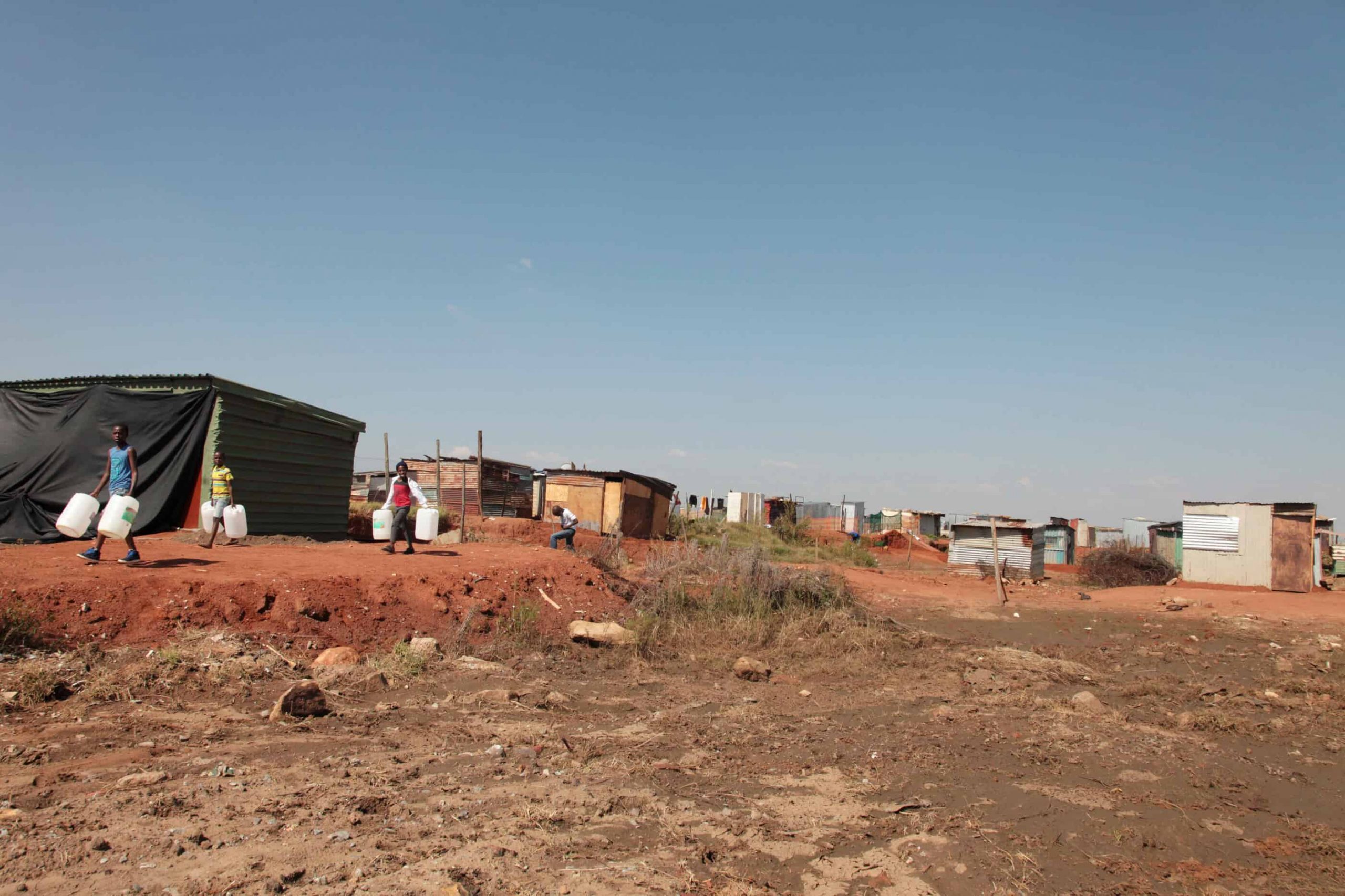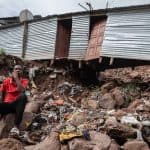No respite for the shack dwellers of Gabon
Evictions, floods and municipal uncertainty have made life even more difficult than usual for the residents of the Gabon shack settlement in Ekurhuleni. They wonder what’s next.
Author:
13 May 2019

Residents of the Gabon shack settlement in Ekurhuleni have had a tough few weeks. Their possessions and homes have been destroyed and damaged by Ekurhuleni Metro Police Department (EMPD) and the Land Invasion Unit, and they have endured a devastating flood due to heavy rains.
Gabon activist, Vusi Khoza, who has recently joined Abahlali baseMjondolo, says authorities fail to pay attention to them but pay attention to big townships like Alexandra.
“People from informal settlements are not recognised as [humans]. They don’t take us seriously because we are a small community, shack dwellers must be recognised,” he argues.
Khoza, 47, says that shacks were demolished and building materials destroyed in a blaze on 24 March.
Some residents went to work and came back to lost, burned, or damaged possessions. Others found their belongings on the back of an impounding truck. A few residents have tried to claim their goods back, he says.
Residents claim that they received no prior warning or court order informing them that they were not to be on the property and could potentially face eviction from the Land Invasion Unit. Although no rubber bullets were fired, and there were no injuries, the lack of warning speaks volumes of the failure of metro police officers to abide by the law.
In the Constitution, Section 26(3) does not permit arbitrary evictions and states that no one may be evicted from their home or have their home demolished without a court order made after considering all the relevant circumstances.

Settlement ruined
Only chipped bricks, clear-glass shards and dry plastered cement remain where shacks stood before they were destroyed by the eviction and the flood. Deep, massive toilet pits stand gaping next to destroyed shacks – their bottoms filled with sand, plastics, big rocks and colourful advertisement inserts.
Ntokozo Simelane, 29, used to work at KFC until her employment ended abruptly two years ago. She moved to Gabon when she could no longer afford R600 in rent. Simelane is rebuilding her shack despite her trepidation.
“I am scared but [community representatives] told me to come back or else my stand would be taken by someone else,” she says.
Related article:
Gabon is estimated to have a population of over 6 000 people from surrounding areas such as Chris Hani, Barcelona and Daveyton. Most of the residents do not have anywhere else to go, do not want to return to their cramped conditions, or cannot afford rent.
The land in question is no stranger to evictions, having been the playground for brutal evictions just under 10 years ago. Prior to the Constitutional Court handing down a landmark judgment in the Modderklip case in 2010 about adequate housing and access to housing, the land was bought by the municipality from a private owner who had tried to evict occupants from his land.
No municipality clarity
Khoza claims that despite using different avenues to ascertain the municipality’s plans for the land, they were not told of anything definite and thus resolved to move in two years ago.
Dumisani Ncapayi, 51, has been living in Gabon since 1999 when it was still private property. He says many people were moved to Chief Albert Luthuli Park in Ekurhuleni, but he stayed with those who were allowed to remain in Gabon by the municipality. He says the only difference between then and now is that they have blue portable toilets that are drained fortnightly.
Ncapayi says that in 2009 the Red Ants destroyed 350 shacks, with only 72 surviving. He is shocked that even after the 2010 ruling, people are being evicted from the newly occupied side of Gabon, where Section 10 of the Constitution is a myth as many live without any dignity.
The small silver shacks scattered along the eTwatwa offramp stand shining bright in the foreground of lush green fields where cows lazily graze near a group of church folk clad in white.
A dusty pathway that interconnects the sprawling site eventually leads to a muddy low-lying area that became heavily flooded during a storm that hit the area during heavy rains. A week after the deluge, many clothes are still hung out to dry, the cement is still wet and the shacks are all damp, mirroring the dampened spirits of the residents.
As a result of the flood, clay-brown mud grips stubbornly to shoes, leaving wet footprints everywhere. In some of the ice-cold shacks, the water was as high as a person’s chest, but now everything is soiled or dusty brown.

Aftermath of the flood
A heavily distressed Maria Nzuza, 50, says “My concern is my food. All of my mielie meal got wet, everything can get ruined but not the food.”
Lining some shoes up in the sun, she says sadly, “I worked before, I could sow, but I got osteoporosis.” Displaying her shaking hands, she says “I am very weak.”
A scrawny Nzuza has smeared a homemade green mask on a lip scab she says refuses to heal. She has had it for three months. Nzuza is HIV+, and has high blood pressure and diabetes. She says she is still taking her treatment, but because she also has ulcers, nurses have told her that she cannot take certain medication.
Related article:
On a second visit, residents explain that Nzuza was dropped off at the hospital by a local after an ambulance was called but did not show up. Police and ambulances cannot make it through the maze of unnamed brown pathways.
Sharon Mofoekeng, 25, moved from the Basotho section of Daveyton, Ekurhuleni and says she had to adjust to life without electricity, but with the help of others, she learned how to make the switch to paraffin (R11 a litre) and candles.
Mofoekeng’s appliances are collecting dust now that she has moved to a place with no electricity but she says the move was worth it.
She makes use of an informal water connection and toilet as well.
Self-reliance for essentials
The women in the ever-growing community found an old pipe which runs down the settlement, dug a hole and simply redirected the water. The tap benefits, among others, two women washing their dishes in a green tub right next to a smelly pit toilet. Two other taps are the other sources of water in the community.
Mofoekeng says when they wash their clothes, they have to let the neighbours at the bottom of the settlement know because the foamy water carves its way through the soil down to their side and often causes a stench.
The smell is worsened by the many pit toilets that attract swarms of flies and maggots. Mokoena explains that six people use one portable toilet. When the toilet hole is full, they simply close it up with sand and bricks and dig a new one, but this costs money.
“Where will we find space? How will we open it? Where will we dig?” she asks.“There is already no space as people want to extend their homes because their families are growing.”

‘I won’t lie and vote’
Mary Hlongwane, 33, interjects, “You see how we live here? We don’t have toilets, we don’t have anything, it’s just a struggle because we have no place to live. I will not vote.
“I won’t lie and vote for a party while living here, hai … it’s all the same, they only give us attention now but after we vote, they don’t give us attention, and there is no improvement.”
Mofoekeng responds: “[Being poor] means people in shacks must just not get attention? As the community, we just want attention and to have the right things done for us.” She adds that women and children are the ones who suffer most in shack settlements.
Ekurhuleni spokesperson Themba Gadebe told New Frame that the land belongs to the municipality and that there are development plans for it, including the intention to address the housing backlog in Daveyton, eTwatwa and Benoni. Gadebe said that the municipality only provides electricity to shack settlements that have been aligned with the contested and poorly implemented re-blocking programme.
Ekurhuleni Metro Police Department’s Kobeli Mokheseng said that the order to evict came from the municipal office, adding that there is no need for a court order when evicting people, particularly if they have occupied a “dangerous area”. He said officers had adhered to law enforcement processes when they gave residents a warning beforehand, which the community denies. Mokheseng discouraged people from building on municipal or private land, and directed them to sign up with the housing department.



